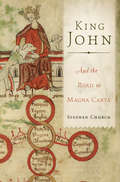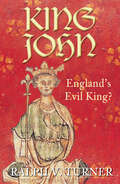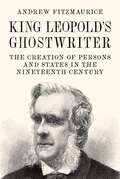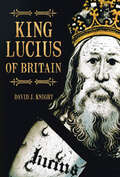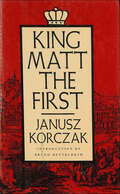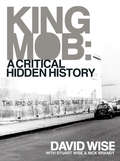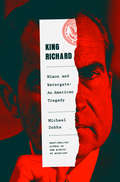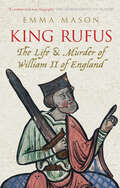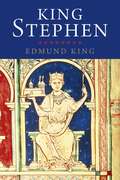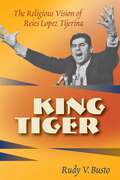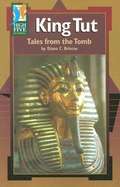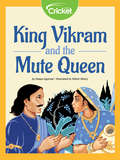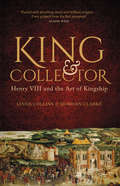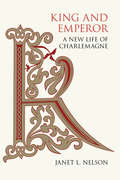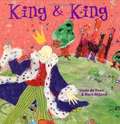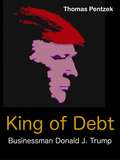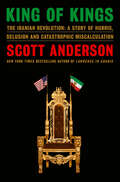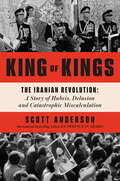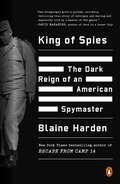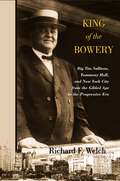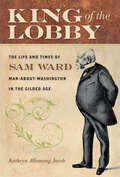- Table View
- List View
King John: And the Road to Magna Carta
by Stephen ChurchKing John has long been dubbed one of the "vilest” of English kings. He was brutish, untrustworthy, and ruled as a virtual tyrant--and yet his reign changed the course of English history. As renowned medieval historian Stephen Church argues, John’s importance has for too long been overshadowed by more heroic family members like Richard the Lionhearted and Eleanor of Aquitaine. John was a skilled political manipulator, but his traditional belief in the unchecked power of the sovereign became increasingly unpopular during his reign, leading to frequent confrontations between the king and his barons. In 1215, a group of barons rebelled in response to John’s repressive fiscal policies. The peace treaty that resulted was the Magna Carta, which enshrined the king’s obligation to rule within the framework of the law. King John offers an authoritative portrait of King John and the moment that signaled the end of the age of absolute monarchy and the dawn of constitutional law.
King John: England's Evil King?
by Ralph V TurnerKing John long ago acquired the epithet 'Bad', and he is reputed to be the worst of England's kings. Before his death in 1216, his desperate exploitation of his subjects for ever more money had turned him into the mythical monster of Hollywood legend. In marked contrast to his brother Richard, John appeared incompetent in battle, failing to defend Normandy (1202-04), and was unsuccessful in recovering his lost lands in 1214. A continuing crisis was a constant need for money, forcing John to drain England of funds for campaigns in France, demanding unlawful and oppressive new taxes. Adding to his evil reputation was an ill-tempered personality and a streak of pettiness and spitfulness that led him to monstrous acts, including murdering his own nephew. King John's unpopularity culminated in a final crisis, a revolt by the English baronage, 1215-16, aimed at subjecting him to the rule of law, that resulted in his grant of Magna Carta.
King Leopold's Ghostwriter: The Creation of Persons and States in the Nineteenth Century
by Andrew FitzmauriceA dramatic intellectual biography of Victorian jurist Travers Twiss, who provided the legal justification for the creation of the brutal Congo Free StateEminent jurist, Oxford professor, advocate to the Archbishop of Canterbury, Travers Twiss (1809–1897) was a model establishment figure in Victorian Britain, and a close collaborator of Prince Metternich, the architect of the Concert of Europe. Yet Twiss&’s life was defined by two events that threatened to undermine the order that he had so stoutly defended: a notorious social scandal and the creation of the Congo Free State. In King Leopold&’s Ghostwriter, Andrew Fitzmaurice tells the incredible story of a man who, driven by personal events that transformed him from a reactionary to a reformer, rewrote and liberalised international law—yet did so in service of the most brutal regime of the colonial era.In an elaborate deception, Twiss and Pharaïlde van Lynseele, a Belgian prostitute, sought to reinvent her as a woman of suitably noble birth to be his wife. Their subterfuge collapsed when another former client publicly denounced van Lynseele. Disgraced, Twiss resigned his offices and the couple fled to Switzerland. But this failure set the stage for a second, successful act of re-creation. Twiss found new employment as the intellectual driving force of King Leopold of Belgium&’s efforts to have the Congo recognised as a new state under his personal authority. Drawing on extensive new archival research, King Leopold&’s Ghostwriter recounts Twiss&’s story as never before, including how his creation of a new legal personhood for the Congo was intimately related to the earlier invention of a new legal personhood for his wife.Combining gripping biography and penetrating intellectual history, King Leopold&’s Ghostwriter uncovers a dramatic, ambiguous life that has had lasting influence on international law.
King Lucius of Britain
by David J KnightWhile everyone knows the story of King Arthur, few will have heard of King Lucius, a figure who has been consigned to myth and largely forgotten in the annals of British history. Examining the primary sources as well as the archaeological evidence for this second century king, David Knight convincingly refutes the generally accepted view expounded at the beginning of the twentieth century that identifies Lucius as King Abgarus of Edessa. King Lucius of Britain reconstructs the story of this fascinating figure, who applied to the Pope for formal baptism in AD 177, making him the first Christian King in Britain, and traces the history of the story of Lucius, separating the myth from reality and attempting to restore this King to his rightful place in British history.
King Matt the First
by Janusz KorczakA child king introduces reforms to give children the same rights as adults.
King Mob: A Critcal Hidden History
by David Wise"I met a prostitute - Angela W - from the fishing port of Grimsby on the mouth of the Humber in the North of England. I instantly fell in love with her in an all consuming way. The pain inside my body, so massively accumulated with the death of hopes for the social revolution...was wrenched away from me as she slowly...shambled towards me." So begins Dave Wise's first hand account of King Mob, the late 60s London based political grouping formed after core members were excluded from the Situationist International. From a radical, working class perspective, Wise recounts their attempts to move "from the Situationist salon to the street", whilst frankly outlining identifying tactical, strategic and theoretical holes in the groups' day to day actions. Plans to blow up waterfalls, getting arrested on demos dressed as pantomine horses (the back end got off in court, on the grounds he didn't know what the front end was doing...), sharing oversized baked bean costumes with ultra-Maoists on Vietnam marches. Getting high and hungrily devouring Coleridge, De Quincey, Rimbaud, Marx, De Sade, Breton, Joyce and Hegel. Urinating over the lectern whilst declaring the death of art at the 1968 English Surrealist convention, being (falsely) put in the frame for the 1969 Newcastle School of Art firebombing; perhaps most infamously dressing up as Santa Claus in Selfridges toy dept, Xmas '69, and watching the chaos of consumerism unfold before them as crying children had the King Mob freely-gifted toys wrenched from their arms by employees. As the downturn of the early 1970's approached, and with it the apparent end of any hope for imminent social revolution, some of King Mob drifted off into various strands of bourgeois counterculture, whilst others faced up to the harsher realities of the "capsized utopia". Some didn't make it through, as an at times unintentionally moving epilogue here recalls. "A Critical Hidden History" is a living, breathing account of a brief moment in time, when the light got through the cracks in the wall, and a new world felt possible. As we career into the 21st century, the relevance of the playful, life affirming, non-hierarchical, anti-capitalists King Mob seems as great today as it ever did.
King Richard: Nixon and Watergate--An American Tragedy
by Michael Dobbs"Rich and kaleidoscopic… Dobbs has carved out something intimate and extraordinary, skillfully chiseling out the details to bring the story to lurid life."—Jennifer Szalai, New York Times From the best-selling author of One Minute to Midnight: a riveting account of the crucial days, hours, and moments when the Watergate conspiracy consumed, and ultimately toppled, a president.In January 1973, Richard Nixon had just been inaugurated after winning re-election in a historic landslide. He enjoyed an almost 70 percent approval rating. But by April 1973, his presidency had fallen apart as the Watergate scandal metastasized into what White House counsel John Dean called &“a full-blown cancer.&” King Richard is the intimate, utterly absorbing narrative of the tension-packed hundred days when the Watergate conspiracy unraveled as the burglars and their handlers turned on one another, exposing the crimes of a vengeful president.Drawing on thousands of hours of newly-released taped recordings, Michael Dobbs takes us into the heart of the conspiracy, recreating these traumatic events in cinematic detail. He captures the growing paranoia of the principal players and their desperate attempts to deflect blame as the noose tightens around them. We eavesdrop on Nixon plotting with his aides, raging at his enemies, while also finding time for affectionate moments with his family. The result is an unprecedentedly vivid, close-up portrait of a president facing his greatest crisis.Central to the spellbinding drama is the tortured personality of Nixon himself, a man whose strengths, particularly his determination to win at all costs, become his fatal flaws. Rising from poverty to become the most powerful man in the world, he commits terrible errors of judgment that lead to his public disgrace. He makes himself—and then destroys himself.Structured like a classical tragedy with a uniquely American twist, King Richard is an epic, deeply human story of ambition, power, and betrayal.
King Rufus: The Life and Murder of William II of England
by Emma MasonThe future William II was born in the late 1050s the third son of William the Conqueror. The younger William, - nicknamed Rufus because of his ruddy cheeks - at first had no great expectations of succeeding to the throne. This biography tells the story of William Rufus, King of England from 1087-1100 and reveals the truth behind his death.
King Stephen
by Edmund KingThis compelling new biography provides the most authoritative picture yet of King Stephen, whose reign (1135-1154), with its "nineteen long winters" of civil war, made his name synonymous with failed leadership. After years of work on the sources, Edmund King shows with rare clarity the strengths and weaknesses of the monarch. Keeping Stephen at the forefront of his account, the author also chronicles the activities of key family members and associates whose loyal support sustained Stephen's kingship. In 1135 the popular Stephen was elected king against the claims of the empress Matilda and her sons. But by 1153, Stephen had lost control over Normandy and other important regions, England had lost prestige, and the weakened king was forced to cede his family's right to succession. A rich narrative covering the drama of a tumultuous reign, this book focuses well-deserved attention on a king who lost control of his destiny.
King Tiger: The Religious Vision of Reies Lípez Tijerina
by Rudy V. BustoRight now we look like a cricket. What is a cricket? King of the Insects; a little, tiny animal. All the cricket can do is [say] 'cricket, cricket, cricket.' Just a noise, that's all. But you know, if that cricket gets in the ear of the lion and scratches inside, there is nothing the lion can do. There is nothing; there is no way the lion can use his claws and jaws to destroy the cricket. The more the lion scratches himself the deeper the cricket goes. . . .--Reies López Tijerina, 1971Throughout his career in New Mexican land grant politics, Reies Tijerina frequently used this fable to inspire persistence in the face of impossible odds. As the leader of a grassroots Hispano land rights organization, the Alianza Federal de Mercedes Reales (The Federal Alliance of Land Grants), Tijerina has made an indelible imprint on New Mexico's Hispano culture. King Tiger details Tijerina's life and efforts--those real, rumored, and mythologized--in the first systematic study of the origin of his political ideas. Rudy Busto shows how one of Tijerina's particularly powerful mystical visions led him to northern New Mexico to fight to restore land to those who lost it during various nineteenth-century land grant title conflicts. More than three decades after the infamous Tierra Amarilla County courthouse raid, Tijerina remains an important touchstone for all New Mexicans. In his life and activism are found the interdependent issues of land, water, language, economic development, sovereignty, political power, and rights to cultural formation in the Southwest.
King Tut: Tales From the Tomb
by Diana C. BriscoeReaders of all ability levels will want to read these high-low books from 5 high-interest nonfiction subject areas: sports, history, biography, adventure, and science. Each easy-to-read book explores a fascinating narrative account of the subject. This all-new series features historical photographs, full-color graphics, glossary words on each page, and a contemporary chapter-book format. Copyright © Libri GmbH. All rights reserved.
King Vikram and the Mute Queen
by Deepa AgarwalKing Vikram loves his subjects and will do anything to make them happy—even if it means trying to convince a mute queen to marry one of them! Will he succeed?
King and Collector: Henry VIII and the Art of Kingship
by Siobhan Clarke Linda CollinsNo English king is as well-known to us as Henry VIII: famous for six marriages; for dissolving the monasteries; and for the ruthless destruction of those who stood in his way. But Henry was also an ardent patron of the arts whose tapestries and paintings, purchased in pursuit of glory and magnificence, adorned his lavish court and began the Royal Collection. In contrast to later royal collectors, this king was more interested in storytelling than art for its own sake, and all his commissions relate to one central tale: the glorification of Henry and his realm. His life can be seen through his art collection and the works tell us much about both his kingship and his insecurities. King and Collector tells a unique story of art, power and propaganda in Tudor England.
King and Emperor: A New Life of Charlemagne
by Janet L. Nelson"King and Emperor takes on the compelling suspense of good detective work as well as good history."—The Wall Street Journal Charles I, often known as Charlemagne, is one of the most extraordinary figures ever to rule an empire. Driven by unremitting physical energy and intellectual curiosity, he was a man of many parts, a warlord and conqueror, a judge who promised "for each their law and justice," a defender of the Latin Church, a man of flesh and blood. In the twelve centuries since his death, warfare, accident, vermin, and the elements have destroyed much of the writing on his rule, but a remarkable amount has survived. Janet Nelson's wonderful new book brings together everything we know about Charles I, sifting through the available evidence, literary and material, to paint a vivid portrait of the man and his motives. Building on Nelson’s own extraordinary knowledge, this biography is a sort of detective story, prying into and interpreting fascinating and often obdurate scraps of evidence, from prayer books to skeletons, gossip to artwork. Charles’s legacy lies in his deeds and their continuing resonance, as he shaped counties, countries, and continents; founded and rebuilt towns and monasteries; and consciously set himself up not just as King of the Franks, but as the head of the renewed Roman Empire. His successors—even to the present day—have struggled to interpret, misinterpret, copy, or subvert his legacy. Janet Nelson gets us as close as we can hope to come to the real figure of Charles the man as he was understood in his own time.
King and King
by Stern Nijland Linda De HaanWhen the queen insists that the prince get married and take over as king, the search for a suitable mate does not turn out as expected.
King of Debt – Businessman Donald J. Trump
by Thomas PentzekWho is Donald J. Trump? That’s what the whole world has been wanting to know since November 2016! Those who live outside the US only knew him from his appearances on the reality show The Apprentice, in which he presented himself as a successful businessman. One thing stands out, however: where other millionaires or billionaires shy away from the public, Trump takes every opportunity to put himself out there, to the extent that it is difficult to separate reality from the perfect performance. When researching for my book The King of Debts, I had the opportunity to study the successes and failures of Donald Trump. Every additional affair, every professional failure and every attack on the media I discovered shocked me more. Slowly a picture emerged of the billionaire who in 2017 became the president of one of the most important countries in the world. Why does he react the way he does? Why does he act the way he does? What is the basis for his success in the US?
King of Fools: The Dark Truth Behind the Romantic Legend of Edward & Wallis
by John ParkerWas the Duke of Windsor a tragic romantic torn by duty & desire? Was he merely a shallow weakling, lacking the character to fulfill his destiny? Or was he something more villainous? In this startling biography, top British journalist John Parker exposes the Duke's & Duchess's ties with Nazis, Fascists, organized crime, gambling, sexual deviance - and even murder - to reveal a couple who compromised the integrity of the British monarchy & ultimately put all of Europe in danger.
King of Kings: The Iranian Revolution: A Story of Hubris, Delusion and Catastrophic Miscalculation
by Scott AndersonNew Year’s Eve, 1977, on a state visit to Iran, President Jimmy Carter toasted Shah Mohammad Reza Pahlavi, King of Kings, Light of the Aryans, Shadow of God on Earth, praising Iran as “an island of stability “ due to “your leadership and the respect and admiration and love which your people give to you.” <p> Iran had the world’s fifth largest army and was awash in billions of dollars in oil revenues. Construction cranes dotted the skyline of its booming capital, Tehran. The regime’s feared secret police force SAVAK had crushed communist opposition, and the Shah had bought off the conservative Muslim clergy inside the country. He seemed invulnerable, and invaluable to the United States as an ally in the Cold War. <p> Fourteen months later the Shah fled Iran into exile, forced from the throne by a volcanic religious revolution led by a fiery cleric named Ayatollah Khomeini. The ensuing hostage crisis forever damaged America’s standing in the world. How could the United States, which had one of the largest CIA stations in the world and thousands of military personnel in Iran, have been so blind? <p> The spellbinding story Scott Anderson weaves is one of a dictator blind to the disdain of his subjects and a superpower blundering into disaster. Scott Anderson tells this astonishing tale with the narrative brio, mordant wit, and keen analysis that made his bestselling Lawrence of Arabia one of the key texts in understanding the modern Middle East. The Iranian Revolution, Anderson convincingly argues, was as world-shattering an event as the French and Russian revolutions. In the Middle East, in India, in Southeast Asia, in Europe, and now in the United States, the hatred of economically-marginalized, religiously-fervent masses for a wealthy secular elite has led to violence and upheaval – and Iran was the template. King of Kings is a bravura work of history, and a warning. <p> <b>New York Times Bestseller<./b>
King of Kings: The Iranian Revolution: A Story of Hubris, Delusion and Catastrophic Miscalculation
by Scott AndersonFrom the author of the acclaimed international bestseller Lawrence in Arabia, a stunningly revelatory narrative history of one of the most momentous events in modern times and the dawn of the age of religious nationalism.On November 16th, 1977, at a state dinner in the White House, President Jimmy Carter toasted Shah Mohammad Reza Pahlavi, King of Kings, Light of the Aryans, Shadow of God on Earth, praising his &“enlightened leadership&” and extolling Iran as &“a stabilizing influence in that part of the world.&” Iran had the world&’s fifth largest army and was awash in billions of dollars in oil revenues. Construction cranes dotted the skyline of its booming capital, Tehran. The regime&’s feared secret police force SAVAK had crushed communist opposition, and the Shah had bought off the conservative Muslim clergy inside the country. He seemed invulnerable, and invaluable to the United States as an ally in the Cold War. Fourteen months later the Shah fled Iran into exile, forced from the throne by a volcanic religious revolution led by a fiery cleric named Ayatollah Khomeini. How could the United States (and other Western allies), which had one of the largest CIA stations in the world and thousands of military personnel in Iran, have been so blind? The spellbinding story Scott Anderson weaves is one of a dictator oblivious to the disdain of his subjects and a superpower blundering into disaster. The Shah emerges as a fascinating, Shakespearean character – a wannabe Richard III unaware of the depth of dissent to his rule, indecisive like Hamlet when action was called for, and at the end Lear-like as he raged against his fate. The Americans made terrible decisions at almost every juncture, from a secret pact designed by Kissinger and Nixon, to dismissing reports from the one diplomat who saw how hated the Shah was by the Iranian people (unlike almost all his colleagues, he spoke Farsi), to Jimmy Carter allowing the Shah to come to America for medical treatment, which set off the hostage crisis which forever damaged American influence in the world. Scott Anderson tells this astonishing tale with the narrative brio, mordant wit, and keen analysis that made his bestselling Lawrence in Arabia one of the key texts in understanding the modern Middle East. Based on voluminous research and dozens of interviews, King of Kings is driven by penetrating portraits of the people involved – the Iranian-American doctor who convinced American officials Khomeini was a moderate; the American teacher who learned of Khomeini&’s influence long before the cleric was even mentioned in official reports; the Shah&’s court minister who kept a detailed diary of all their interactions; the Shah&’s wife Farah who still mourns her lost kingdom; the hypocritical and misguided Jimmy Carter; and the implacable Khomeini who outmaneuvered his foes at every turn. The Iranian Revolution, Anderson convincingly argues, was as world-shattering an event as the French and Russian revolutions. In the Middle East, in India, in Southeast Asia, in Europe, and the United States, the hatred of economically-marginalized, religiously-fervent masses for a wealthy secular elite has led to violence and upheaval – and Iran was the template. King of Kings is a bravura work of history, and a warning.
King of Spies: The Dark Reign of America's Spymaster in Korea
by Blaine HardenFrom the New York Times bestselling author of Escape from Camp 14, the shocking, gripping account of the most powerful American spy you’ve never heard of, whose role at the center of the Korean War—which gave rise to the North Korean regime—is essential to understanding the most intractable foreign policy conflict of our time. In 1946, master sergeant Donald Nichols was repairing jeeps on the sleepy island of Guam when he caught the eye of recruiters from the army's Counter Intelligence Corps. After just three months' training, he was sent to Korea, then a backwater beneath the radar of MacArthur's Pacific Command. Though he lacked the pedigree of most U.S. spies—Nichols was a 7th grade dropout—he quickly metamorphosed from army mechanic to black ops phenomenon. He insinuated himself into the affections of America’s chosen puppet in South Korea, President Syngman Rhee, and became a pivotal player in the Korean War, warning months in advance about the North Korean invasion, breaking enemy codes, and identifying most of the targets destroyed by American bombs in North Korea. But Nichols's triumphs had a dark side. Immersed in a world of torture and beheadings, he became a spymaster with his own secret base, his own covert army, and his own rules. He recruited agents from refugee camps and prisons, sending many to their deaths on reckless missions. His closeness to Rhee meant that he witnessed—and did nothing to stop or even report—the slaughter of tens of thousands of South Korean civilians in anticommunist purges. Nichols’s clandestine reign lasted for an astounding eleven years. In this riveting book, Blaine Harden traces Nichols's unlikely rise and tragic ruin, from his birth in an operatically dysfunctional family in New Jersey to his sordid postwar decline, which began when the U.S. military sacked him in Korea, sent him to an air force psych ward in Florida, and subjected him—against his will—to months of electroshock therapy. But King of Spies is not just the story of one American spy: with napalmed villages and severed heads, high-level lies and long-running cover-ups, it reminds us that the darkest sins of the Vietnam War—and many other conflicts that followed—were first committed in Korea.
King of the Bowery: Big Tim Sullivan, Tammany Hall, and New York City from the Gilded Age to the Progressive Era (Excelsior Editions)
by Richard F. WelchKing of the Bowery is the first full-length biography of Timothy D. "Big Tim" Sullivan, the archetypal Tammany Hall leader who dominated New York City politics—and much of its social life—from 1890 to 1913. A poor Irish kid from the Five Points who rose through ambition, shrewdness, and charisma to become the most powerful single politician in New York, Sullivan was quick to perceive and embrace the shifting demographics of downtown New York, recruiting Jewish and Italian newcomers to his largely Irish machine to create one of the nation's first multiethnic political organizations. Though a master of the personal, paternalistic, and corrupt politics of the late nineteenth century, Sullivan paradoxically embraced a variety of progressive causes, especially labor and women's rights, anticipating many of the policies later pursued by his early acquaintances and sometimes antagonists Al Smith and Franklin D. Roosevelt. Drawing extensively on contemporary sources, King of the Bowery offers a rich, readable, and authoritative potrayal of Gotham on the cusp of the modern age, as refracted through the life of a man who exemplified much of it."... a necessary book for anyone unsatisfied by the usual histories of Irish-American urban political machines. ... The Irish-American boss has rarely been awarded the careful appraisal of the kind that Welch ... gives Sullivan. ... But caveat lector: you don't have to be Irish American or a New Yorker or a Democrat to enjoy this book. All you have to be is interested in a well-told story that is also a first-rate work of history." — Peter Quinn, Commonweal
King of the Cloud Forests
by Michael MorpurgoAfter being rescued in the mountains of Tibet by a near-human tribe who revere him as a god, Ashley must choose between returning to the violence of the village he fled and the tests of courage that await him as the tribe's god.
King of the Lobby: The Life and Times of Sam Ward, Man-About-Washington in the Gilded Age
by Kathryn Allamong JacobKing of the Lobby tells the story of how one man harnessed delicious food, fine wine, and good conversation to the task of becoming the most influential lobbyist of the Gilded Age.Sam Ward was a colorful character. Scion of an old and honorable family, best friend of Henry Wadsworth Longfellow, and charming man-about-Washington, Ward held his own in an era crowded with larger-than-life personalities. Living by the motto that the shortest route between a pending bill and a congressman’s "aye" was through his stomach, Ward elegantly entertained political elites in return for their votes.At a time when waves of scandal washed over Washington, the popular press railed against the wickedness of the lobby, and self-righteous politicians predicted that special interests would cause the downfall of democratic government, Sam Ward still reigned supreme. By the early 1870s, he had earned the title "King of the Lobby" and jokingly referred to himself as "Rex Vestiari." Ward cultivated a style of lobbying that survives today in the form of expensive golf outings, extravagant dinners, and luxurious vacations. Kathryn Allamong Jacob's engaging account shows how the "king" earned his crown through cookery and conversation and how this son of wealth and privilege helped to create a questionable profession in a city that then, as now, rested on power and influence.
King of the Lobby: The Life and Times of Sam Ward, Man-About-Washington in the Gilded Age
by Kathryn Allamong JacobA biography of the “influential and engaging character” who courted Congress with food, wine, and gifts in the post-Civil War era (The Washington Post Book World).King of the Lobby tells the story of how one man harnessed delicious food, fine wine, and good conversation to become the most influential lobbyist of the Gilded Age.Scion of an old and honorable family, best friend of Henry Wadsworth Longfellow, and charming man-about-town, Sam Ward held his own in an era crowded with larger-than-life personalities. Living by the motto that the shortest route between a pending bill and a congressman’s “aye” was through his stomach, Ward elegantly entertained political elites in return for their votes.At a time when waves of scandal washed over Washington, the popular press railed against the wickedness of the lobby, and self-righteous politicians predicted that special interests would cause the downfall of democratic government, Sam Ward still reigned supreme. By the early 1870s, he had earned the title “King of the Lobby,” cultivating an extraordinary network of prominent figures and a style that survives today in the form of expensive golf outings, extravagant dinners, and luxurious vacations. Kathryn Allamong Jacob’s account shows how the king earned his crown, and how this son of wealth and privilege helped to create a questionable profession in a city that then, as now, rested on power and influence.“Her extensive research is reflected in her recounting of Ward’s life, successfully putting it into the context of the history of lobbying…will appeal to American history buffs.” —Publishers Weekly
